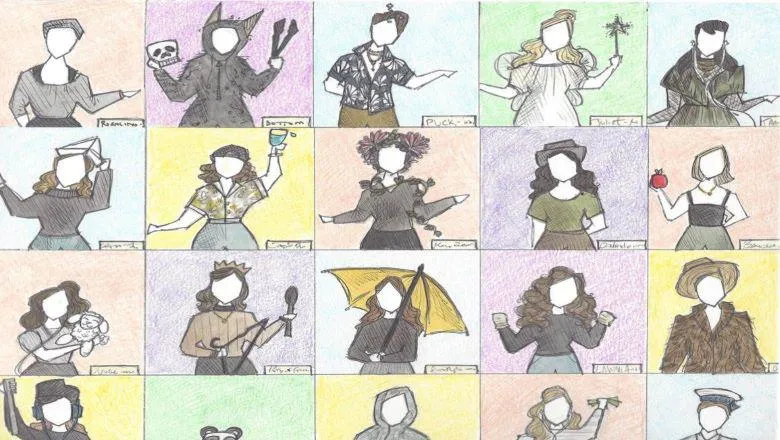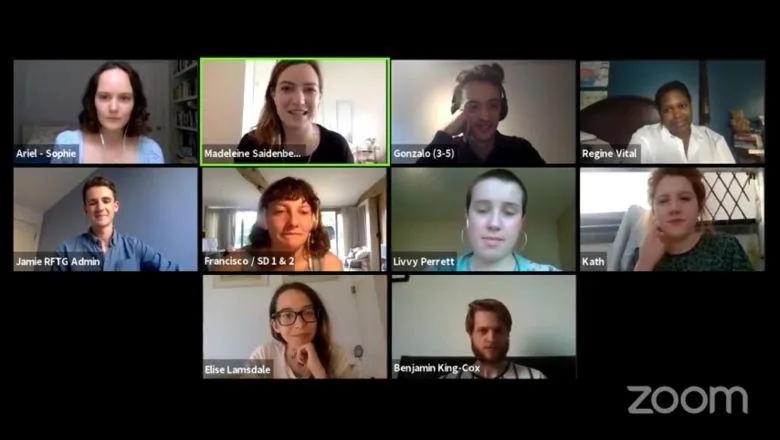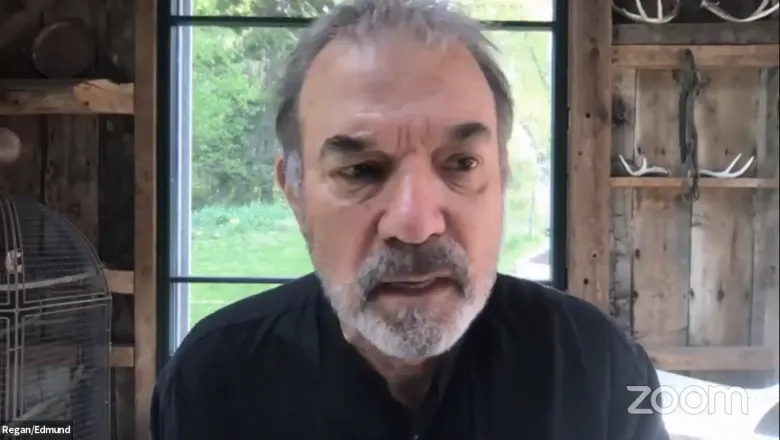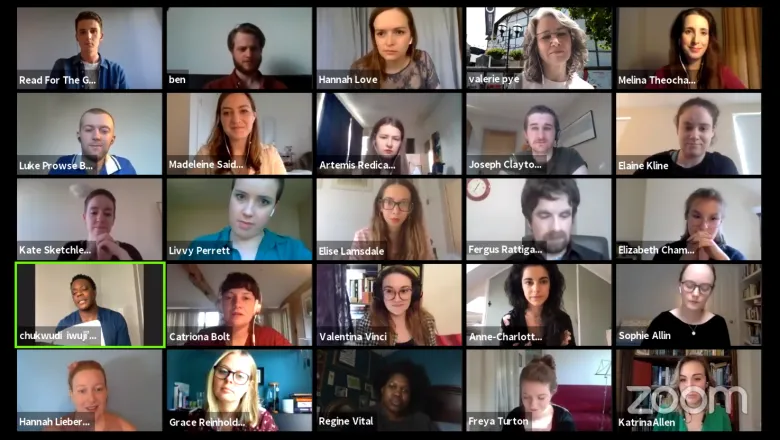We're a group of friends who met on the Shakespeare Studies MA, who love the Globe as it's such an important space for artists and scholars to experiment with new ideas about theatre in Shakespeare's time and how it connects to theatre now. We wanted to raise awareness of the Globe’s importance and also some money to help keep its doors open for future audiences.
Catriona Bolt, King’s alumna and co-founder of Read for the Globe
29 May 2020
Former King's students raise over £13,000 for Shakespeare's Globe
Alumni of the Shakespeare Studies MA conducted a 48-hour readathon to help save the iconic London theatre

Like many theatres, Shakespeare’s Globe is struggling to find funding after closing due to the COVID-19 pandemic. To help raise much-needed funds and awareness of the theatre’s plight, a group of former King’s students brought together hundreds of people from around the world to read a selection of their favourite Shakespeare plays over 48 hours. So far, ‘Read for the Globe’ has raised more than £13,000.
The group who organised Read for the Globe met in 2018 when they began the Shakespeare Studies MA, which is taught jointly by King’s and the Globe. Since graduating in 2019, they have stayed in contact and when they heard that the Globe may have to close its doors permanently, they knew they had to do something together to prevent that from happening.

The ten friends decided to host a 48-hour readathon of The Bard’s greatest hits, such as Hamlet, King Lear and Macbeth, as well as some of the lesser known but still much-loved plays, including Cymbeline and Pericles. Within hours of putting their call out for volunteer readers on Twitter, they were overwhelmed by responses from individuals from all corners of the world who wanted to take part.
The initiative was a huge success and over the UK’s Spring Bank Holiday weekend (from Saturday 23 to Monday 25 May) 200 volunteers read 16 plays, all of which are available to view on the Read for the Globe YouTube channel.
The 200 volunteers that participated in ‘Read for the Globe’ included several renowned actors, such as Chukwudi Iwuji, Rose Wardlaw, Jessica Warbeck, Jonnie Broadbent, Emily Carding and Kevin McNally. World-leading Shakespeare scholars also came forward to read, including Professor Stephen Greenblatt (Cogan University Professor of the Humanities at Harvard University), Dr Valerie Pye (Assistant Professor of Theatre at LIU Post), Dr Miranda Fay Thomas (Assistant Professor in Theatre and Performance at Trinity College Dublin) and Professor Ramie Targoff (Professor of English at Brandeis University).
To ensure the process was fair, volunteer readers were asked to sign up to a time slot, rather than for a play. Once the volunteers logged on for their chosen time, the parts were cast then and there. Katherine Corner (one of the Read for the Globe co-founders) noted that, aside from some minor technical issues and some frantic messaging behind the scenes, this method resulted in an ‘exciting experiment in community theatre’, through which ‘the readers had the opportunity to do something that totally enthused them.’

The Read for the Globe initiative was born out of the passion and intellectual curiosity of our MA alums. Our joint MA programme aims to do more than just teach students about theatre history and early modern performance; it aims to instil in students, who may be future scholars or theatre artists, that the Globe Theatre is a site like no other because it brings together the past and the present moment. It is a place where scholarship meets art and where storytelling and intellectual enquiry go hand in hand. This really inspires people, so it is hard to imagine life without the Globe on the cultural landscape.
Professor Farah Karim-Cooper, Head of Higher Education & Research for Shakespeare’s Globe and Globe Professor of Shakespeare Studies at King’s College London
As well as raising vital funds for the Globe, the readathon brought people together in an act of creation, despite the volunteer readers being in different places and time zones. The plays were animated by the readers’ collective passion for Shakespeare, the creative use of household props, some inspired Zoom backgrounds and quick reactions to comments on the Read for the Globe Twitter account.
A virtual audience also began to grow around Read for the Globe, with people engaging with the plays on Twitter and through the live chat function on YouTube. Some people even created fan art inspired by the performances. Commenting on this collaborative community of readers and audience members, Sophie Allin said, ‘people have been in contact to say how much the experience meant for them which we didn’t foresee.’
Madeleine Saidenberg, who is currently in the United States, took the “night shift” for Twelfth Night (which ran from 4:00-7:30am BST) and noticed that the UK cast members were starting to get tired. To reenergise the cast, she started a poll on Twitter asking the audience to vote for their favourite bromance in the play which provoked a competition among the volunteer readers. Madeleine observed, ‘the play suddenly came to life just as I could see dawn breaking in the windows behind people.’

The readathon also provided an alternative scholarly insight into the texts, with the group noting that some plays worked better than others, even those that are usually considered to be highly visual, such as The Tempest. Madeleine said, ‘we had a lot of scholars involved who got to read the plays in a different way.’
The team were also motivated to raise funds for the Globe due to the vital role it plays in educating school children about Shakespeare. ‘We think the Globe is such an important space to save because it brings together the scholarly world, the theatrical world, and the educational world for younger students’, Sophie explained. ‘In terms of service to the community, the Globe provides thousands of free tickets to school children in Southwark, and to lose that would be absolutely heart-breaking.’
When they finished the final play on Monday evening, the group described feeling emotional that the readathon was over. However, this is not goodbye forever as the Read for the Globe team have plans to host more virtual play readings in order to raise funds and awareness of the challenges that theatres all over the world are facing.
I can’t tell you how thankful we are, and how proud of our MA students, past and present. The group from the 18-19 cohort mobilised in what seemed like hours to organise a 48-hour readathon with participants from across the world, and raised over £13,000 for the Globe at a critical time in its life; we’ll never cease to be grateful.
Dr Will Tosh, Research Fellow and Lecturer, Shakespeare’s Globe
Follow @GlobeRead to be the first to know about future Read for the Globe performances and watch all 16 plays on the Read for the Globe YouTube channel.
King’s students, staff and alumni are #ContinuingToServe their local communities during the COVID-19 pandemic. To discover more #ContinuingToServe stories, visit our webpage and follow @ServiceAtKings on Twitter and Instagram.
